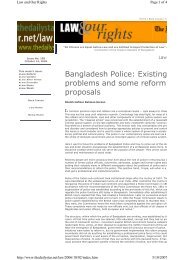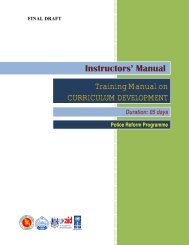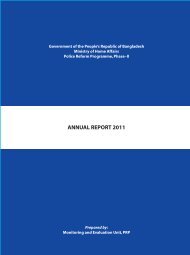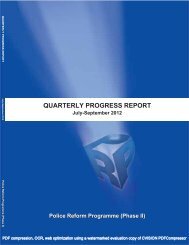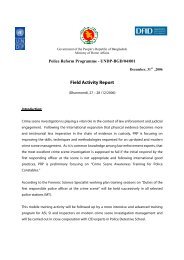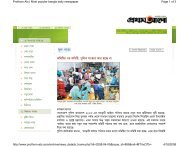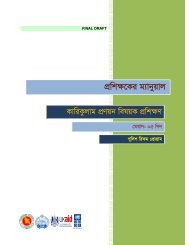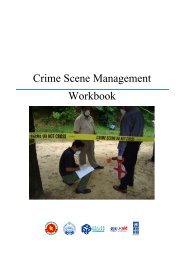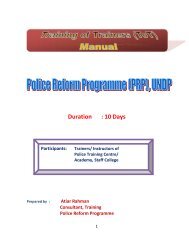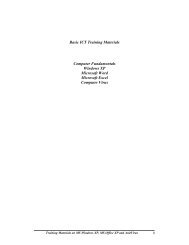Annual Report - Police Reform Programme
Annual Report - Police Reform Programme
Annual Report - Police Reform Programme
Create successful ePaper yourself
Turn your PDF publications into a flip-book with our unique Google optimized e-Paper software.
<strong>Police</strong> <strong>Reform</strong> <strong>Programme</strong><br />
(Phase-II)<br />
Executive Summary<br />
Bangladesh is a developing nation and a fledgling democracy. Since the early 1990's, steady<br />
economic growth resulted in rapid gains in human development. Despite noteworthy achievements in<br />
various fields, including law and order, crime and corruption remain serious problems adversely<br />
affecting individual safety, national security, and continuous economic expansion. Therefore, an<br />
accountable, transparent, and efficient police service is essential in Bangladesh for the safety and<br />
wellbeing of all citizens, in addition to national stability and long-term growth and development. Once<br />
achieved, this positive setting will contribute to the creation of a secure environment which is<br />
conducive to consumer and investor confidence. Within this context, UNDP leads in efforts to<br />
harmonise support to the Justice Sector and has integrated the <strong>Police</strong> <strong>Reform</strong> <strong>Programme</strong> (PRP) into<br />
these efforts. The PRP provides the Bangladesh <strong>Police</strong> with much needed technical and financial<br />
assistance for reformation with development goals centring on a safer, more secure and stable<br />
Bangladesh, where the human rights of citizens-particularly the vulnerable and marginalised-are<br />
promoted and protected in order to accelerate progress on the MDGs, economic growth, and social<br />
justice. The PRP aims to improve safety, access to justice and human rights for the people of<br />
Bangladesh, particularly disadvantaged and vulnerable groups such as women and children who are<br />
considered the PRP's target beneficiaries. The police service will additionally benefit from increased<br />
capacity and job satisfaction, improved morale and better social standing.<br />
The following section summarises key achievements and progress made during 2012 against<br />
expected strategic results.<br />
Strategic Policy Work<br />
Following the dissemination of two PRP comparative legal studies' findings, there has been<br />
noticeable increase in support for the reform of the Bangladesh <strong>Police</strong> Act 1861, including<br />
supportive public statements made by the Prime Minister, Senior Secretary of the MoHA, IGP,<br />
and the National Project Director (NPD). Additionally, a <strong>Police</strong> Working Group formed by the IGP<br />
and chaired by the NPD, is reviewing the 2007 draft <strong>Police</strong> Ordinance, following the draft's return<br />
from the Ministry of Home Affairs.<br />
A draft Gender and Anti-discrimination Policy for the Bangladesh <strong>Police</strong> is currently being<br />
finalised. With PRP support, the Bangladesh <strong>Police</strong> Women's Network established four regional<br />
coordinating committees on gender and has appointed regional focal points. Those committees<br />
will provide regional forums advocating for gender equality, raising awareness on issues affecting<br />
women police, and providing support to women officers.<br />
The completion of the Bangladesh <strong>Police</strong> Strategic Plan 2012-2014 establishes organizational<br />
priorities for the next three years and identifies three key PRP documents among its key sources,<br />
namely the Baseline Survey on Personal Security and <strong>Police</strong> Performance in Bangladesh,<br />
'Sustainable <strong>Police</strong> <strong>Reform</strong> in Bangladesh: from Global Experiences to Local Strategies' and the<br />
<strong>Report</strong> on the Heads of Training Conference.<br />
Development Results<br />
Within the Bangladesh <strong>Police</strong>, the ratio of women police officers increased significantly in the last<br />
three years. During 2012, a total of 1,524 women were recruited into the Bangladesh <strong>Police</strong>,<br />
representing 11.88% of the annual number of recruits in 2012-525 more than in 2011. A day-care<br />
centre, operated by the Ministry of Women and Children Affairs, was established at the Rajarbag<br />
<strong>Police</strong> Lines in Dhaka, providing a safe and secure environment for up to fifty police officers'<br />
children. The PRP supported a ToT initiative on gender awareness, allowing trainers to<br />
successfully conduct twenty-one gender orientation workshops for 1,007 police officers.<br />
08<br />
<strong>Annual</strong> <strong>Report</strong> 2012



